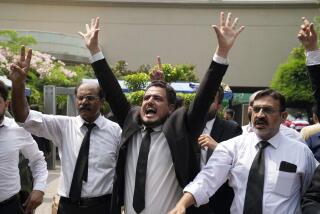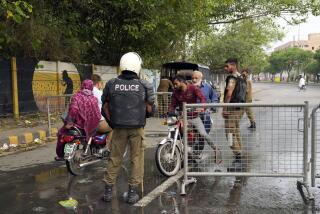Pervez Musharraf flees after Pakistan court orders his arrest
ISLAMABAD, Pakistan -- An Islamabad court Thursday ordered the arrest of former military ruler Pervez Musharraf on charges of illegally detaining dozens of judges while in power, but the former dictator slipped away when Pakistani commandos assigned to provide him security shielded him from an arresting officer outside the courthouse and whisked him away to his sprawling, heavily guarded residence just outside the capital.
The ruling by Islamabad High Court Judge Shaukat Aziz Siddiqui provided further evidence that the onetime autocratâs decision to return to Pakistan after four years of self-imposed exile was a major miscalculation of the extent of support for him within Pakistani society today. Earlier this week, a judge in Peshawar barred him from running in parliamentary elections on May 11, effectively ending his hopes of a resurfacing as a major player in Pakistani politics.
Now the 69-year-old former general faces a very different challenge -- staying out of jail. Lawyers outside the courthouse said the hundreds of Pakistani Rangers deployed to provide Musharraf security have already violated a court order by shielding him from arrest. The commandos would continue to be breaking the law if they persisted in preventing Islamabad police from taking him into custody, they said.
âThe security he has been given is only meant to safeguard his life, not to allow him to avoid the law,â said senior lawyer Chaudhry Muhammad Aslam Ghumman, the complainant in the judgesâ detention case against Musharraf. âThey are flouting the law. The people responsible for implementing the order of the court are facilitating the culprit.â
Musharrafâs aides say he will go to the Pakistani Supreme Court to appeal Siddiquiâs ruling. Pakistani media reported that federal authorities were considering the designation of Musharrafâs compound in Chak Shahzad on the outskirts of Islamabad as a âsubjail,â effectively putting him under house arrest.
âPervez Musharraf is not an ordinary man,â said Muhammad Amjad, a spokesman for Musharrafâs new party, the All-Pakistan Muslim League. âHe is a former president and a former army chief. It would not be appropriate to put him in prison.â
Musharrafâs return appeared doomed from the start. The tepid welcome he received on his arrival March 24 -- only about 2,000 supporters appeared at Karachiâs main airport when his flight arrived from Dubai -- affirmed the widespread belief in Pakistan that Musharraf had overestimated his popularity in a country unwilling to forgive him for eight years of corruption and autocratic rule.
He tried to mount a campaign for the upcoming parliamentary elections, but Pakistani courts disqualified him from running on the grounds that he had suspended the countryâs constitution while in power.
Meanwhile, with his return to Pakistan, Musharraf has been forced to appear in court on three pending criminal cases against him: charges that he did not provide enough security to prevent the 2007 assassination of former Prime Minister Benazir Bhutto, allegations that he ordered the killing of a Baluch nationalist leader in 2006, and the judgesâ detention case.
That case revolves around Musharrafâs decision to purge the countryâs courts of 60 judges in 2007, including Supreme Court Chief Justice Iftikhar Muhammad Chaudhry. He ordered the detention of those judges at their homes, and in 2009 was criminally charged in the case.
Musharraf was Pakistanâs army chief of staff in 1999 when he ousted then-Prime Minister Nawaz Sharif and seized power in a bloodless coup. Two years later, he appointed himself president, keeping his role as army chief. He stepped down from office in 2008 to avoid imminent impeachment proceedings.
Lawyers inside the courtroom say Musharraf appeared stunned by Siddiquiâs ruling to order his arrest. âHe was visibly shaken,â said Saliheen Mughal, a senior lawyer assisting Ghumman in the case. âHe was sweating, and obviously he was clearly upset.â
After the ruling, dozens of commandos providing Musharraf security escorted him out of the courthouse. Within moments of leaving the building, an Islamabad police officer grabbed Musharrafâs arm and tried to arrest him, witnesses said. The commandos pulled Musharraf away and put him in a waiting black sport utility vehicle, which then drove the former general to his compound.
âGen. Musharrafâs act today underscores his disregard for due legal process, and indicates his assumption that as a former army chief and military dictator, he can evade accountability for abuses,â said Ali Dayan Hasan, Pakistan director for Human Rights Watch.
ALSO:
Egyptâs Mubarak ordered back to prison
To cheers and jeers, Margaret Thatcher is laid to rest
Mexican magazine says reporter threatened by government officials
More to Read
Sign up for Essential California
The most important California stories and recommendations in your inbox every morning.
You may occasionally receive promotional content from the Los Angeles Times.










